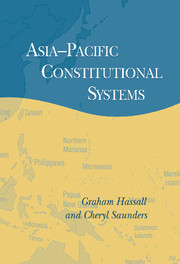Book contents
- Frontmatter
- Contents
- Acknowledgements
- Map: The Asia-Pacific Region
- Introduction
- Part I Modernity and Nation-States at the Dawn of the Global Era
- Part II The Constitution of Modernity
- Part III Democracy and the Rule of Law
- Conclusion: Postmodernity and constitutionalism
- Appendix: Chronology of constitutional events in the Asia Pacific
- Bibliography
- Index
Conclusion: Postmodernity and constitutionalism
Published online by Cambridge University Press: 09 October 2009
- Frontmatter
- Contents
- Acknowledgements
- Map: The Asia-Pacific Region
- Introduction
- Part I Modernity and Nation-States at the Dawn of the Global Era
- Part II The Constitution of Modernity
- Part III Democracy and the Rule of Law
- Conclusion: Postmodernity and constitutionalism
- Appendix: Chronology of constitutional events in the Asia Pacific
- Bibliography
- Index
Summary
This study has suggested that contemporary states in the Asia Pacific have been shaped by history, colonial experience and the struggle for independence, and that they gained independence in forms determined by and acceptable to the metropolitan powers. The first written constitutions of the region were in fact responses to the threat of colonialism and to a desire for 'modernity'.
The 'modern' constitutions of these states have regarded law as a tool for regulating the use of public power, prescribing the rights and duties of their citizens, establishing order and conformity, and managing progress. While they contemplate constitutional amendments, they also generally proclaim the nation-state to be the most highly evolved embodiment of the people's sovereignty. Paradoxically, while most independence constitutions claim to be 'autochthonous', they were invariably influenced by the constitutions and the legal systems of their colonial masters.
A majority of states in the Asia Pacific can thus be regarded as 'postcolonial' in that their constitutional values and practices were either copied from colonial authorities or established in reaction to them. They favour, as a consequence, access to the state by elites, whether as representatives or as beneficiaries. 'The language of the law' is not that of ‘the people’.
At the same time, these modern formal systems of law and political authority often intertwined with pre-existing rules of custom. Western systems based on majoritarian rule have traditionally been premised on homogeneous societies; studies of plural societies show that the permanent relegation of ethnic groups to the status of electoral minorities leads in time to dissatisfaction with the system.
- Type
- Chapter
- Information
- Asia-Pacific Constitutional Systems , pp. 241 - 249Publisher: Cambridge University PressPrint publication year: 2002

